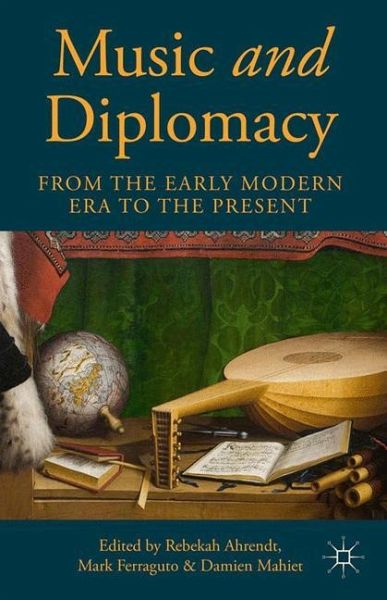
Broschiertes Buch
Music and Diplomacy from the Early Modern Era to the Present
Versandkostenfrei!
Versandfertig in 6-10 Tagen

PAYBACK Punkte
33 °P sammeln!





How does music shape the exercise of diplomacy, the pursuit of power, and the conduct of international relations? Drawing together international scholars with backgrounds in musicology, ethnomusicology, political science, cultural history, and communication, this volume interweaves historical, theoretical, and practical perspectives.
Rebekah Ahrendt, Yale University, USA Melvin L. Butler, University of Chicago, USA Mario Dunkel, TU Dortmund University, Germany Mark Ferraguto, Pennsylvania State University, USA Danielle Fosler-Lussier, Ohio State University, USA Giulia Giovani, German Historical Institute, Rome, Italy Anne-Madeleine Goulet, CNRS/Center for Baroque Music, Versailles, France Harm Langenkamp, Utrecht University, The Netherlands Damien Mahiet, Independent Scholar, USA Frédéric Ramel, Sciences Po Paris, France Kendra Salois, University of Maryland, College Park, USA Arne Spohr, Bowling Green State University, USA M. Paula Survilla, Wartburg College, USA Ellen R. Welch, University of North Carolina, Chapel Hill, USA Willow F. Williamson, American University, USA Jonathan Yaeger, Juilliard School, USA
Produktdetails
- Verlag: Macmillan Education / Palgrave Macmillan US / Springer Palgrave Macmillan
- Artikelnr. des Verlages: 978-1-349-50019-2
- 1st ed. 2014
- Seitenzahl: 304
- Erscheinungstermin: 10. Dezember 2014
- Englisch
- Abmessung: 216mm x 140mm x 17mm
- Gewicht: 384g
- ISBN-13: 9781349500192
- ISBN-10: 1349500194
- Artikelnr.: 45082849
Herstellerkennzeichnung
Palgrave Macmillan
Tiergartenstr. 17
69121 Heidelberg
ProductSafety@springernature.com
"Damien Mahiet, Mark Ferraguto, and Rebekah Arendt have put together a smart, engaging, and important set of essays on the use of music, musical events, and musical personalities in domestic and international diplomacy. ... All of the essays in this volume are thoughtful and considered, engaging conscientiously with the concepts of power, control, embodiment, performance, audience, and other crucial concepts. I applaud the authors and editors, and recommend this book highly and without hesitation." (Kendra Preston Leonard, H-war, h-net.org, March, 2016)
"Music, often billed as the 'universal language,' has long played a part on the international political stage. This book explores exactly what diplomatic channels have availed
"Music, often billed as the 'universal language,' has long played a part on the international political stage. This book explores exactly what diplomatic channels have availed
Mehr anzeigen
themselves of music, from seventeenth-century Italy to the post-Soviet world we inhabit. The three editors have assembled an impressive group of international scholars for this exciting transdisciplinary project." - Alexander Rehding, Fanny Peabody Professor of Music, Harvard University, USA
"An exciting and important contribution to the burgeoning scholarship on cultural diplomacy, Music and Diplomacy from the Early Modern Era to the Present offers a fascinating longue durée exploration of the myriad uses of music in diplomacy. Brilliantly historicizing debates over the power of music, the volume illuminates moments when music has created dispositions and opportunities that have changed the flows of diplomacy." - Penny Von Eschen, Professor, History and American Culture, University of Michigan, USA
"An exciting and important contribution to the burgeoning scholarship on cultural diplomacy, Music and Diplomacy from the Early Modern Era to the Present offers a fascinating longue durée exploration of the myriad uses of music in diplomacy. Brilliantly historicizing debates over the power of music, the volume illuminates moments when music has created dispositions and opportunities that have changed the flows of diplomacy." - Penny Von Eschen, Professor, History and American Culture, University of Michigan, USA
Schließen
Für dieses Produkt wurde noch keine Bewertung abgegeben. Wir würden uns sehr freuen, wenn du die erste Bewertung schreibst!
Eine Bewertung schreiben
Eine Bewertung schreiben
Andere Kunden interessierten sich für











